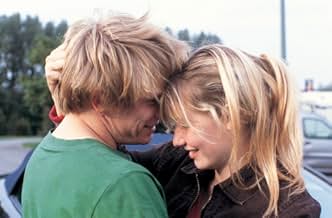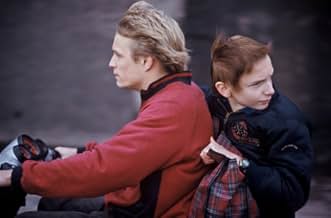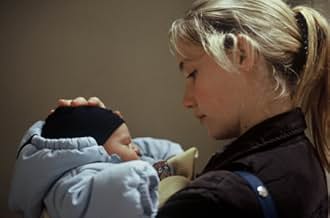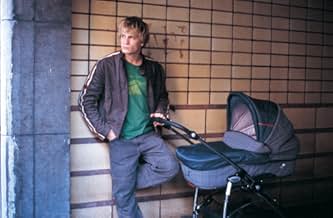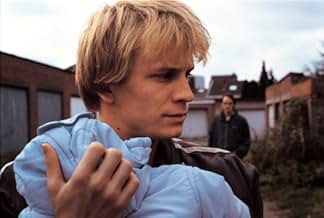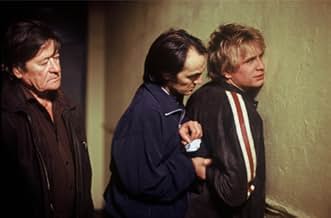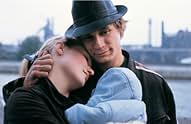IMDb-BEWERTUNG
7,4/10
19.908
IHRE BEWERTUNG
Der Kleinkriminelle Bruno und seine Freundin Sonia bekommen ein Kind, für das Bruno keine Gefühle empfinden kann. Nachdem er das Neugeborene verkauft, begreift er allmählich sein Vergehen.Der Kleinkriminelle Bruno und seine Freundin Sonia bekommen ein Kind, für das Bruno keine Gefühle empfinden kann. Nachdem er das Neugeborene verkauft, begreift er allmählich sein Vergehen.Der Kleinkriminelle Bruno und seine Freundin Sonia bekommen ein Kind, für das Bruno keine Gefühle empfinden kann. Nachdem er das Neugeborene verkauft, begreift er allmählich sein Vergehen.
- Regie
- Drehbuch
- Hauptbesetzung
- Auszeichnungen
- 14 Gewinne & 21 Nominierungen insgesamt
Anne Gerard
- Commerçante
- (as Anne Gérard)
Leon Michaux
- Policier Commissariat
- (as Léon Michaux)
Empfohlene Bewertungen
I had the fortune to go see this at its Belgian premiere, which was attended by the main, and stunningly beautiful female actress, Déborah François. I found myself to be interested in the story from the start. The beginning of the film starts very simply, a young mother with a new-born baby searching on the street for what the audience presumes at the time, and is later verified to be the father of her child. The storyline then develops more as a sketch of the day-to-day living at the bottom of Belgian society. Though despite the fact a grim picture of the central couple's living situation is presented, the film-maker has not crossed the line and has interlaced many light-hearted moments into the movie.
The story develops as Bruno, the baby's father, is quickly shown to have no real interest in the baby or fatherhood, just in making money. He also is portrayed to have a genuine love for Sonya. In this sense the audience follows Brunos life, knowing not whether to cheer him or pray for his downfall, after he makes several questionable choices about the fate of his baby.
I recommend this film to anyone who enjoys a simple film without Hollywood special effects, planned cinematography or any sort of soundtrack. I can see its appeal, but personally I came away wondering what exactly the director was trying to prove by making this film. He did succeed,however, to provide a somewhat entertaining, if slightly heavy film. The cast are excellent.
The story develops as Bruno, the baby's father, is quickly shown to have no real interest in the baby or fatherhood, just in making money. He also is portrayed to have a genuine love for Sonya. In this sense the audience follows Brunos life, knowing not whether to cheer him or pray for his downfall, after he makes several questionable choices about the fate of his baby.
I recommend this film to anyone who enjoys a simple film without Hollywood special effects, planned cinematography or any sort of soundtrack. I can see its appeal, but personally I came away wondering what exactly the director was trying to prove by making this film. He did succeed,however, to provide a somewhat entertaining, if slightly heavy film. The cast are excellent.
L'infant belongs to Sophie and Bruno, both feckless, petty criminals, in a seedy Belgian city. She has just come out of prison (?)with the newborn. She goes to their apartment but finds that Bruno has sublet the place to a bilious couple, so she has to track Bruno down at work trying to cadge small change from passers by. He is pleased to see her but diffident towards his son: Jimmy.
They spend the night in a shelter, or rather she does, as he cuts his time short to fence his stolen goods to a woman who drops a hint that if they're not up to raising a child they could adopt it out for a good price.
After showing us how they can only seem to communicate through adolescent rough housing, we are left with the distinct impression that they are too immature for parenthood. A few days later, while they wait in line, Bruno offers to walk the baby. He then sells it to a baby selling gang, and returns to show Sophie the wad of cash. Sophie passes out from shock.
We see not one wit of shame or guilt from Bruno up to this point. He is, we presume, an amoral street thug, out for how to make the next buck, and found the baby to good an opportunity to pass up for a sizable reward. Besides, given the empty life the baby will be looking forward to, the adoption by a better off couple doesn't seem to be bad for the child.
Sophie passing out seems to bring him to his senses. Is he remorseful? Does he love her? Up to this point all we have seen of their relationship is one of two vapid adolescent children, with no hint of any plans to make a future for their off-spring.
He carries her to a hospital and starts calling his go between to have the deal undone. At this point his motivation is left deliberately unclear. Is he doing so because he regrets his actions and needs to make it up to Sophie, or is he doing it because her accusations are over heard by the staff and the police will soon be carting him off to jail? In any event he manages to get the child back, giving up the E5,000 without a whimper, but then faces the angry brokers who are now out their E5,000. When he returns to the hospital with the baby the police are there and he makes up the story that he was just pretending to sell the child as revenge for her infidelity, and then calmly disowns the child as his.
Sophie refuses to talk with him and the police have to back off, and at this point in the movie we are no clearer to discerning any hint of empathy stirring in Bruno's pock marked face. I felt sorry for Sophie in her realization that her lover is as calloused as his feet, but presumed she would soon allow him back into her life. Yet as morally revolted as I was by Bruno, I still wanted to see if he could manage some kind of redemption.
The movie ends in leaving us to answer that question ourselves.
The crux of the movie is Bruno's character, or lack of it. He is no sociopath; he is not evil; his bland personality is as banal and unattractive as cold soup. He seems to not be dangerous, until faced with too much temptation to his greed. Yet he is difficult to hate. He is like that black sheep relative we all have and shake our heads about, so that we can whistle past the graveyard of our own inadequacies. He is what humanity can become when the spirit slumbers. He is society's unwitting sin eater.
They spend the night in a shelter, or rather she does, as he cuts his time short to fence his stolen goods to a woman who drops a hint that if they're not up to raising a child they could adopt it out for a good price.
After showing us how they can only seem to communicate through adolescent rough housing, we are left with the distinct impression that they are too immature for parenthood. A few days later, while they wait in line, Bruno offers to walk the baby. He then sells it to a baby selling gang, and returns to show Sophie the wad of cash. Sophie passes out from shock.
We see not one wit of shame or guilt from Bruno up to this point. He is, we presume, an amoral street thug, out for how to make the next buck, and found the baby to good an opportunity to pass up for a sizable reward. Besides, given the empty life the baby will be looking forward to, the adoption by a better off couple doesn't seem to be bad for the child.
Sophie passing out seems to bring him to his senses. Is he remorseful? Does he love her? Up to this point all we have seen of their relationship is one of two vapid adolescent children, with no hint of any plans to make a future for their off-spring.
He carries her to a hospital and starts calling his go between to have the deal undone. At this point his motivation is left deliberately unclear. Is he doing so because he regrets his actions and needs to make it up to Sophie, or is he doing it because her accusations are over heard by the staff and the police will soon be carting him off to jail? In any event he manages to get the child back, giving up the E5,000 without a whimper, but then faces the angry brokers who are now out their E5,000. When he returns to the hospital with the baby the police are there and he makes up the story that he was just pretending to sell the child as revenge for her infidelity, and then calmly disowns the child as his.
Sophie refuses to talk with him and the police have to back off, and at this point in the movie we are no clearer to discerning any hint of empathy stirring in Bruno's pock marked face. I felt sorry for Sophie in her realization that her lover is as calloused as his feet, but presumed she would soon allow him back into her life. Yet as morally revolted as I was by Bruno, I still wanted to see if he could manage some kind of redemption.
The movie ends in leaving us to answer that question ourselves.
The crux of the movie is Bruno's character, or lack of it. He is no sociopath; he is not evil; his bland personality is as banal and unattractive as cold soup. He seems to not be dangerous, until faced with too much temptation to his greed. Yet he is difficult to hate. He is like that black sheep relative we all have and shake our heads about, so that we can whistle past the graveyard of our own inadequacies. He is what humanity can become when the spirit slumbers. He is society's unwitting sin eater.
Although I have not seen all other Cannes' comp. films, I think this is a worthy winner of the Palm d'or. The film's scenery is gray Seraing, like the previous Dardenne films, and I think this is the first film in which the camera-work complements the scenery and story near perfectly. Scene's often contain only one or two shots, cutting right when everything has been said. Its one of the few films where I did not notice the camera (I'm a student cameraman), which should be the goal of every cameraman, at least in this style of film. The acting is very impressive (especially Jeremie Renier as Bruno), like previous Dardenne Films. The film seems the most accessible Dardenne so far, although it does not bore in simplicity (I saw it twice in one week, avant-premiere and sneak preview, and I liked the second time best).
10Dengoku
Earlier this evening, I was attending the premiere of "L'Enfant" in Belgian theaters.
"L'Enfant" shows us a socio-drama, with a story located in the southern region of Belgium, in a city called Seraing, where most movies of the Dardenne brothers are situated.
I will not go into any plot summaries, but let me make a comparison with other directors, so you might get a clue if you'd like to watch this movie or not. Socio-drama is a genre in film not only made in Belgium. Many great directors have made solid socio-drama's: Aki Kaurismaki, Ken Loach, Mike Leigh and many others.
Where you can find a twist of humor in Kaurismaki's movies, you'll have a hard time finding it in "L'Enfant". A high level of realism avoids any dramatization of the struggle-for-life the protagonists experience. This makes it for the viewer not easier to swallow. The absence of a soundtrack even increases this effect.
This movie has many strong points, and although I haven't seen many of the other films who were competing with "L'Enfant" at the Cannes film festival 2005, I think this film has fairly won the Palme d'Or because it scores very high on the essential aspects of film-making: acting, camera-work (see comment by Toon Creemers) and script (dialogues).
I highly recommend this movie, but don't expect to be visually entertained the way we are used to by big budget films from Hollywood. Movies like these don't need a lot of dialogue, fancy one-liners or historical quotes - the picture says it all, in a simple but effective way.
Enjoy,
"L'Enfant" shows us a socio-drama, with a story located in the southern region of Belgium, in a city called Seraing, where most movies of the Dardenne brothers are situated.
I will not go into any plot summaries, but let me make a comparison with other directors, so you might get a clue if you'd like to watch this movie or not. Socio-drama is a genre in film not only made in Belgium. Many great directors have made solid socio-drama's: Aki Kaurismaki, Ken Loach, Mike Leigh and many others.
Where you can find a twist of humor in Kaurismaki's movies, you'll have a hard time finding it in "L'Enfant". A high level of realism avoids any dramatization of the struggle-for-life the protagonists experience. This makes it for the viewer not easier to swallow. The absence of a soundtrack even increases this effect.
This movie has many strong points, and although I haven't seen many of the other films who were competing with "L'Enfant" at the Cannes film festival 2005, I think this film has fairly won the Palme d'Or because it scores very high on the essential aspects of film-making: acting, camera-work (see comment by Toon Creemers) and script (dialogues).
I highly recommend this movie, but don't expect to be visually entertained the way we are used to by big budget films from Hollywood. Movies like these don't need a lot of dialogue, fancy one-liners or historical quotes - the picture says it all, in a simple but effective way.
Enjoy,
L'Infant is extraordinary surprising. I never had seen a Belgian movie so I was very curious about this when I was in the theater.
The script is about 2 young youths that aren't yet mature already carrying the burden of taking care of their own baby. Unemployed, without any good prospect of a real future, school droppers and not having reached maturity, they went on living just for the moment. The father is just a young, dull and irresponsible teenager that lives thru schemes and small petty crimes. The mother, looking as a 12 years old girl, thrives to support the child and don't discourage the way of living of her "husband", seen by her as fair and needed to aid their life.
The film focuses also on the illegal and dark commerce of adoption and selling of children, which is by the way what the boy will do to gain a load of money...
The movie then runs to decadence, regret, awareness of childish mistakes and bad options that, without surprise, would lead to an expected nightmare... jail.
Great acting, fair dialog(Due to the content of the story) and a voyage to the sorrow for the misfortunes of these 2 child-parents.
The script is about 2 young youths that aren't yet mature already carrying the burden of taking care of their own baby. Unemployed, without any good prospect of a real future, school droppers and not having reached maturity, they went on living just for the moment. The father is just a young, dull and irresponsible teenager that lives thru schemes and small petty crimes. The mother, looking as a 12 years old girl, thrives to support the child and don't discourage the way of living of her "husband", seen by her as fair and needed to aid their life.
The film focuses also on the illegal and dark commerce of adoption and selling of children, which is by the way what the boy will do to gain a load of money...
The movie then runs to decadence, regret, awareness of childish mistakes and bad options that, without surprise, would lead to an expected nightmare... jail.
Great acting, fair dialog(Due to the content of the story) and a voyage to the sorrow for the misfortunes of these 2 child-parents.
Wusstest du schon
- WissenswertesJimmy is played by 40 different babies.
- VerbindungenFeatured in Smagsdommerne: Folge #3.17 (2006)
Top-Auswahl
Melde dich zum Bewerten an und greife auf die Watchlist für personalisierte Empfehlungen zu.
- How long is The Child?Powered by Alexa
Details
- Erscheinungsdatum
- Herkunftsländer
- Offizielle Standorte
- Sprache
- Auch bekannt als
- The Child
- Drehorte
- Rue de la Banque, Seraing, Liège, Wallonia, Belgien(Sonia's apartment exteriors)
- Produktionsfirmen
- Weitere beteiligte Unternehmen bei IMDbPro anzeigen
Box Office
- Budget
- 3.600.000 € (geschätzt)
- Bruttoertrag in den USA und Kanada
- 651.941 $
- Eröffnungswochenende in den USA und in Kanada
- 44.537 $
- 26. März 2006
- Weltweiter Bruttoertrag
- 5.507.396 $
- Laufzeit
- 1 Std. 35 Min.(95 min)
- Farbe
- Sound-Mix
- Seitenverhältnis
- 1.66 : 1
Zu dieser Seite beitragen
Bearbeitung vorschlagen oder fehlenden Inhalt hinzufügen


